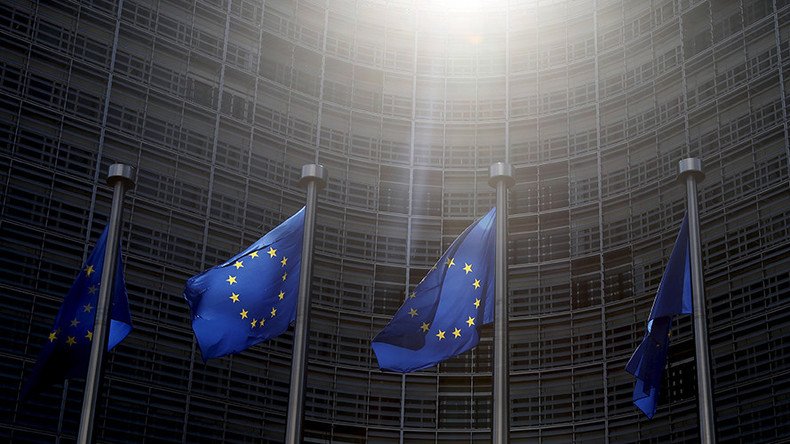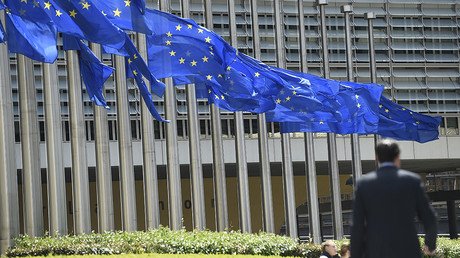Brussels to act ‘within days’ if US sanctions hurt EU trade with Russia – internal memo

The EU should act “within days” if new sanctions the US plans to impose on Russia prove to be damaging to Europe’s trade ties with Moscow, an internal memo seen by the media says. Retaliatory measures may include limiting US jurisdiction over EU companies.
An internal memo seen by the Financial Times and Politico has emerged amid mounting opposition to a US bill seeking to hit Russia with a new round of sanctions. The bill, if signed into law, will also give US lawmakers the power to veto any attempt by the president to lift the sanctions.
The document reportedly said European Commission chief Jean-Claude Juncker was particularly concerned the sanctions would neglect the interests of European companies. Juncker said Brussels “should stand ready to act within days” if sanctions on Russia are “adopted without EU concerns being taken into account,” according to the Financial Times.
The EU memo also warns that “the measures could impact a potentially large number of European companies doing legitimate business under EU measures with Russian entities in the railways, financial, shipping or mining sectors, among others.”
Restrictions against Russia come as part of the Countering Iran’s Destabilizing Activities Act, targeting not only Tehran, but also North Korea. Initially passed by the Senate last month, the measures seek to impose new economic measures on major sectors of the Russian economy.
The draft legislation would also introduce individual sanctions for investing in Gazprom’s Nord Stream 2 gas pipeline project, outlining steps to hamper construction of the pipeline and imposing sanctions on European companies which contribute to the project.
Morning London, while you were sleeping this was our most read story https://t.co/eC4kSgYeHN
— Financial Times (@FT) July 24, 2017
Other energy projects, such as the Caspian Sea oil and gas pipelines, the Ukraine gas transit, and the Zohr field off the Egyptian coast, may also be affected due to the participation of Russian companies.
The freshly leaked memo suggests that the EU is seeking “a public declaration” from the Trump administration that it will not apply the new sanctions in a way that targets European interests, as cited by Politico.
Other options on the table include triggering the ‘Blocking Statute,’ an EU regulation that limits the enforcement of extraterritorial US laws in Europe. A number of “WTO-compliant retaliatory measures” are also being considered, according to the memo.
Earlier on Sunday, the bloc expressed its unease over the sanctions bill. Noting that “the Russia/Iran sanctions bill is driven primarily by domestic considerations,” the European Commission said in a statement that it “could have unintended consequences, not only when it comes to Transatlantic/G7 unity, but also on EU economic and energy security interests.”
Kremlin spokesman Dmitry Peskov said on Monday that “we heard of some corrections to the administration’s stance on sanctions and will wait patiently until it is clearly articulated.” He reiterated that Russia believes the restrictions are “counterproductive” and are harming both US and Russian interests.
Russian President Vladimir Putin earlier warned that any new sanctions on Russia will only result in the deterioration of US-Russia relations.
Germany, Russia’s main European trading partner, called the bill “a peculiar move,” also promising a swift response to it. Some American corporations, including BP, ExxonMobil, General Electric, Boeing, Citigroup, MasterCard, and Visa, have reportedly lobbied against the move.
The corporations, according to a CNN report, want changes to the bill, while lobbyists and trade associations have been visiting Capitol Hill in recent days meeting with members of Congress.
The House of Representatives is expected to vote on the controversial sanctions bill on Tuesday. Previously, adoption of the draft was put on hold as the House was reluctant to pass it, citing “procedural issues.”
The White House also argued against parts of the Senate edition of the bill, including the demand that US President Donald Trump obtain Congress' permission before easing sanctions.
It is “unlikely” that the European Union delegation will somehow be able to change the minds of US lawmakers on more anti-Russian sanctions, as the move is already backed by a majority in both the House of Representatives and the Senate, Martin McCauley, an author and political analyst, told RT.
Brussels may say “we’re going to increase tariffs, put pressure on American companies” operating in the EU in retaliation, but “on the whole, the Americans have a stronger position here because their businesses – except the very big oil companies – aren’t relay affected as much as Europe” by the sanctions, he said.
“The politics of the situation is that the House of Representatives and the Senate want to restrict president Trump’s ability to do any deal with Russia on his own as president. You may have a constitutional crisis if he, in fact, rejects the will” of the lawmakers, McCauley said.
“It’s a game of politics in America to restrict President Trump. And unfortunately, one of the losers may, in fact, be the EU,” he stressed.















